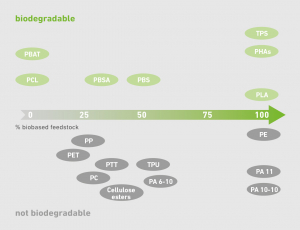PRODUCTS
Our bioplastics product range
Our product range is divided into 3 categories of bioplastic granulates:
- Biologically based and biodegradable bioplastics
- Biologically based and non-biodegradable bioplastics
- Petroleum-based and biodegradable bioplastics
The chart below illustrates the current technically possible proportion of biological raw materials in the individual products. Due to ongoing development, this proportion is steadily increasing in many areas. In the coming years, the number of biomaterials made from 100% biological raw materials will continue to increase significantly, especially those made entirely from non-food or waste products and waste water.
Contact us if you would like to learn more about bioplastics not listed on this website.

Biologically based and biodegradable plastics
Bio-Polylactide / Bio-Polylactic Acid [Bio-PLA].
Bio-PLAs are a range of thermoplastic polymers made from 100% annually renewable biomass such as corn, sugar beet and sugar cane, and are biodegradable and industrially compostable.
Applications: Rigid packaging (containers, trays, bottles), flexible packaging (films), everyday goods, nonwovens and textile fibres.
Bio-polyhydroxyalkanoates [Bio-PHA].
Bio-PHAs are a range of thermoplastic polyesters produced from 100% annually renewable biomass such as corn, sugar beet or sugar cane, or from waste materials or by-products from various industries, and are biodegradable and partially industrially compostable.
Applications: rigid packaging (containers, pots, boxes), other consumer goods, horticulture & agriculture, aquaristics / fish farming.
Bio-polyester [PBS, PBSA]
Bio-polyesters are a range of thermoplastics currently produced from up to 50% annually renewable biomass such as sugar cane and are biodegradable and partially industrially compostable. Alternatively, individual biodegradable bio-polyesters such as Bio-PBAT can also be produced from fossil petroleum.
Applications: flexible packaging (films, bags), rigid packaging (containers, pots, boxes), other consumer goods, horticulture / agriculture (mulching, film).
Biologically based and non-biodegradable plastics
Bio-polyethylene [Bio-PE]
Bio-polyethylene is a thermoplastic plastic made from 100% annually renewable biomass such as sugar cane. Bio-PE is neither biodegradable nor compostable. As it has the same chemical properties as conventional PE, it is 100% recyclable and can be processed in existing recycling streams at the end of its life cycle.
Applications: The most widely used plastic in the world, used mainly for packaging.
Bio-polyethylene terephthalate [Bio-PET]
Bio-polyethylene terephthalate is a thermoplastic currently produced from up to 30% annually renewable biomass such as molasses or sugar industry by-products. Bio-PE is neither biodegradable nor compostable. As it has the same chemical properties as conventional PET, it is 100% recyclable and can be processed in existing recycling streams at the end of its life cycle.
Applications: Plastic bottles (PET bottles), films and textile fibres.
Bio-polyamides [Bio-PA]
Bio-polyamides are a group of polyamides currently produced from up to 100% annually renewable biomass such as vegetable oils. Bio-PE is recyclable and non-biodegradable.
Applications: Compounds, textile fibres, technical components, transport, sports and leisure, other consumer goods.
Bio-Polypropylene [Bio-PP]
Bio-Polypropylene is a thermoplastic produced from up to 30% biomass cooking oil waste. Bio-PE is neither biodegradable nor compostable. As it has the same chemical properties as conventional PP, it is 100% recyclable and can be processed in existing recycling streams at the end of its life cycle.
Applications: The second most widely used plastic in the world, used mainly for packaging.
Bio-Elastomers [Bio-TPE, Bio-TPU]
Bio-elastomers are a group of thermoplastic resins that are currently produced from up to 80% annually renewable biomass and are partially biodegradable and industrially compostable.
Applications: sports and leisure, transport, consumer goods
Bio-cellulose esters
Bio-cellulose esters are a group of thermoplastic resins currently produced from up to 63% annual renewable biomass such as wood and are not biodegradable.
Applications: Cosmetics, luxury items
Fossil-based and biodegradable plastics
Bio-PolyButylene-co-Adipate-co-Terepthalate [Bio-PBAT]
Bio-PolyButylene-co-Adipate-co-Terepthalate is a biodegradable and compostable plastic made from fossil raw materials.
Applications: flexible packaging (films, bags), horticulture / agriculture (mulch films, film).
